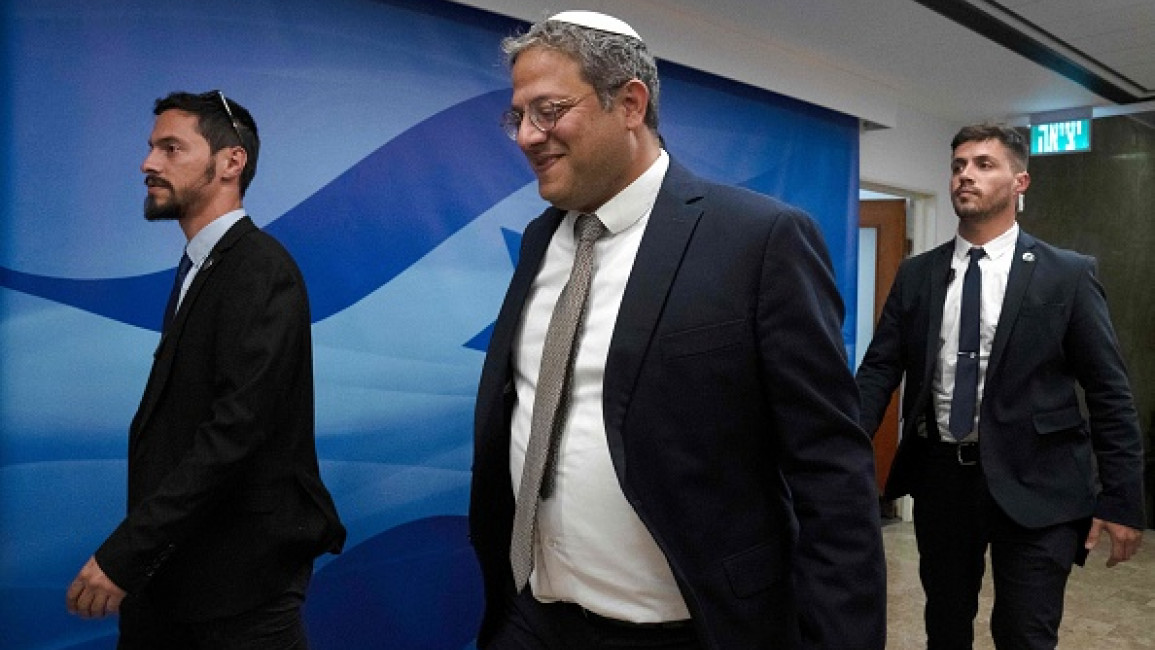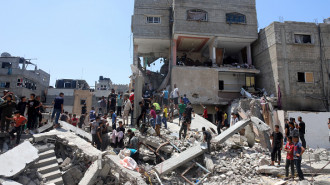Israel approves 'national guard' sought by Ben-Gvir
Israel authorised on Sunday setting up a controversial national guard under extreme-right security minister Itamar Ben-Gvir, who says it will be used to "tackle terrorism", while rival politicians accused him of setting up a sectarian militia.
The previous government had begun moves to set up an auxiliary police force to tackle what it described as internal political violence following pro-Palestinian protests in areas with significant populations of Palestinian citizens of Israel.
The demonstrations were prompted by Tel Aviv's brutal onslaught in the Gaza Strip in May 2021, which killed more than 250 people.
The exact powers of the new national guard will be discussed by a committee comprised of all Israeli security agencies, which will submit recommendations within 90 days, the prime minister's office said in a statement.
It was not immediately clear who would have direct authority over the national guard.
Israel's police chief, Inspector-General Yaacov Shabtai, has expressed misgivings about the new force in a letter to Ben-Gvir, local media reported.
Meanwhile, former Israeli police leader Moshe Karadi, warned that Ben-Gvir could use the national guard force "to lead a coup" against the government. In a scathing statement, he warned current prime minister Benjamin Netanyahu that Ben-Gvir could "use it against him one day", according to The Times of Israel.
Ben-Gvir, a hardline Jewish settler who lives in an illegal settlement in the occupied West Bank with past convictions for support for terrorism and incitement against Palestinians, rose in politics partly due to the 2021 violence in the Sheikh Jarrah area of occupied east Jerusalem.
Ben Gvir has described the planned national guard in media interviews as an update of the previous government's initiative. Discussing its planned deployments, he named only Arab communities hit by riots or crime in Israel as well as along the boundaries with the Palestinian West Bank.
"It will deal with this exclusively. The police does not deal exclusively with this. It's busy with a thousand and one things," he told Army Radio.
Palestinian politicians in Israel have denounced the national guard as a militia for Ben-Gvir. Other opposition figures have accused Ben-Gvir of wanting a new force to crack down on nationwide demonstrations against the government's judicial overhaul plan.
נאמתי הערב בהפגנת האלפים בתל אביב נגד ההסכמה לתת מיליציות חמושות לבן גביר.
— איימן עודה أيمن عودة Ayman Odeh (@AyOdeh) March 29, 2023
נתניהו רוצה להסית את הדיון הדמוקרטיה לתהום של אלימות לאומנית אלימה. לשסות אזרחים נגד אזרחים. אבל אנחנו לא ניתן לו! יהודים וערבים מסרבים להיות אויבים, חייבים להמשיך להאבק למען דימוקרטיה לכולם! pic.twitter.com/d0aeMIizFp
"Why does the State of Israel - which has an army, police, military intelligence, the Shin Bet, Mossad, National Security Council, Prisons Service, riot police, a SWAT team - need another national guard?" Palestinian lawmaker Ayman Odeh wrote on Twitter.
Government funding will enable an initial intake of 1,850 personnel for the new force, Ben-Gvir said, adding that these could be seconded police officers and volunteers, including from the Arab sector.
He said that the national guard would take months to get off the ground and that he was trying to fill police posts in parallel.
Israeli police chief Shabtai questioned the need for the national guard and warned that any separation of it from the police hierachy "could prove most costly and even harm the security of the citizenry," according to the Ynet news site.
Confirming the existence of the letter, Ben-Gvir said he would meet Shabtai on Monday and was open to the possibility of putting the national guard under the command authority of the police "if they're serious and really want it".
Israel has occupied the West Bank and east Jerusalem since 1967 in violation of international law. Beginning in March 2022, it began launching frequent deadly raids against Palestinian cities in the West Bank, killing and injuring hundreds of people.
Palestinians within Israel's 1948 borders have long suffered marginalisation and discrimination, particularly at the hands of the police.
At least 92 Palestinians have been killed by Israeli forces in the West Bank since the beginning of the year, in violence that has intensified since Netanyahu's hard-right government came to power in November 2022.
(Reuters and The New Arab Staff)

![Around 700 Muslims visited the US Capitol this week to advocate for civil and human rights domestically and abroad. [Photo courtesy of CAIR]](/sites/default/files/styles/image_330x185/public/2024-05/USCMO%2024_Larg%20image.jpg?h=95efc4ee&itok=89WOr8zy)

